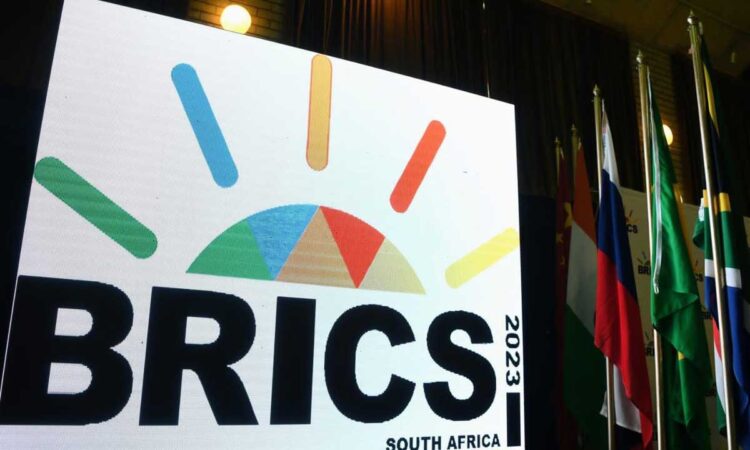
BRICS is a formal alliance of Brazil, Russia, India, China, and South Africa. Its upcoming Summit is scheduled to be held on 22-24 August in Johannesburg, South Arica. BRICS host South Africa has invited 69 countries to attend the upcoming summit. The invitation has been sent to all African heads of nations and the Global South bodies.
As the end of the Summit approaches, the world’s attention is turning toward South Africa, where the BRICS Summit is set to take place. The forthcoming summit holds significant implications for global geopolitics, with its central agenda revolving around the launch of a common currency among the BRICS nations. This move, aimed at reducing the dominance of the US Dollar in international trade, has the potential to reshape the geopolitical landscape and challenge American supremacy. While Russia, China, South Africa, and Brazil are actively advocating for this shift, India’s reluctance and undeclared stance add complexity to the discussions.
The Geopolitical Significance
For decades, the US Dollar has reigned supreme in global trade and transactions, affording the United States unparalleled economic and geopolitical leverage. The US has been using Dollar and economy as tools to coerce and pressurize its adversaries. Imposing sanctions was a common tool against its rivals to achieve political goals. Usually, developing countries were the victims. There has been a growing sentiment against the US hegemony, supremacy, and coercion. In the past several countries or leaders took a stand against the American Hegemony of US Dollar domination. But, as an individual leader or a country, the US snubbed them, the worst victims were Iraq, Libya, and a few nations in South America and Latin America. The proposed launch of a BRICS common currency or de-dollarization aims to alter this status quo, potentially diminishing the American influence and power that is closely tied to the Dollar’s dominance. BRICS is a strong Alliance and plays a huge role in Global Trade and Investments, and above all, it is above American influence. It seems. BRICS is in a position to transform the global economy in total. This move represents a growing discontent with the U.S. dollar’s global dominance and a push toward Eastern superiority.
Russian Stance
Russian officials have been vocal in their support for the BRICS common currency initiative. Sergey Lavrov, Russia’s Foreign Minister, stated, “The BRICS nations possess substantial economic strength. It is only logical that we explore alternatives to the Dollar-dominated global financial system. A common currency could enhance economic cooperation among our nations and contribute to a more balanced world order.”
Chinese Stance
China, as a major global economic player, has also thrown its weight behind the common currency initiative. President Xi Jinping emphasized, “The BRICS nations must pool their resources to challenge the existing financial architecture. We have the economic prowess to establish an alternative currency that will foster multi-polarity in the global economy and curtail unilateral dominance.” China as a single country has a significant share in the global economy and possesses the potential to challenge any hegemony, but, wanted to move unitedly along with BRICS and other nations. China is a country with the largest foreign exchange reserves (Dollars).
Brazilian Stance
Brazil, too, stands in favor of exploring alternatives to the Dollar-centric financial system. Brazilian President, Jair Bolsonaro, expressed, “Our partnership within BRICS offers an opportunity to challenge the existing norms that disproportionately favor a single currency. A common currency could bolster economic cooperation and ensure a fairer representation of our collective strength.”
South African Position
The South African Ambassador revealed exclusively to Watcher Guru, that BRICS will discuss the use of native currencies for cross-border transactions. Sooklal indicated that a decision to ditch the U.S. dollar for global trade could be taken at the upcoming summit.
Indian Stance
India’s stance on the common currency initiative has been marked by caution. Indian Prime Minister Narendra Modi articulated, “While the idea of a BRICS common currency is intriguing, we must thoroughly evaluate its implications for our economy. Any such move should prioritize our national interests and stability.” Indian stance is an illusion and deliberate to sabotage the agenda of BRICS for the upcoming Summit. It is worth mentioning that, India is following an irrational approach in its foreign policy. As India is hostile to all its immediate neighbors, regional alliances like SCO and BRI, whereas, trying to be close with the US and its alliances like Quade, etc. As a matter of fact, India is a misfit in this region and spoiled its relations with all its neighbors including Bangladesh, Bhutan, China, Maldives, Myanmar, Pakistan and Sri Lanka, Nepal. It has created a very tense environment in the entire region and posed as a serious security threat to all these countries. It has been playing a dirty role in SCO and BRI. Now trying to create problems and divide in BRICS.
Expansion and New Members Expected
Forty-four countries have shown interest in joining the BRICS alliance, with 22 formally applying. It is expected that Saudi Arabia, the UAE, and Argentina are rumored to be the first inductees. Many other nations will follow soon, once this trend is initiated.
Again, India is creating hurdles in inducting new members, especially opposing any country like Iran which adversary to the US. It seems, the Indian role in the BRICS is to protect American interests and takes dictation from Washington. Once India is exposed, it might lose its membership in SCO, BRICS and etc.
The upcoming BRICS Summit in South Africa holds the promise of significant geopolitical changes. The initiative to launch a common currency among BRICS nations represents a bold move to challenge the longstanding dominance of the US Dollar. As Russia, China, South Africa, and Brazil advocate for this shift, India’s illusive approach yet undisclosed stance contributes to the complexity of discussions. The outcome of the summit could mark the beginning of a new era in global finance and geopolitics, with potential ramifications for the existing world order.






